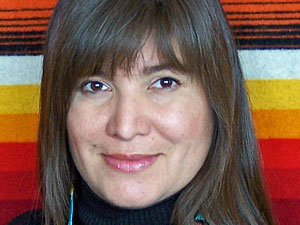 |
| photograph of Waziyatawin is from here |
Genocide in the U.S. is probably the least discussed and least reported on atrocity in the U.S. It's been going on for hundreds of years and is not over. The genocide isn't defined only in terms of mass murder. It is defined by systematic governmental and industrial destruction of cultural, economic, social, and spiritual systems required for a People's survival. The Dakota, among many other nations inside the geographic boundaries of the U.S. of America, are under siege. When will U.S. white folks give a damn, I wonder? And stop hanging Dream Catchers in their windows and from their vehicle's rear view mirrors. Here's a dream worth catching: stopping the genocide against Indigenous People globally, and against the Dakota locally.
What follows are two posts linked together supporting the activist work and values of Waziyatawin (Dakota). With thanks to Brenda, from Censored News, for the first portion. Please click on the title just below to link back.
Native America Calling: Free Speech and Censorship
Thursday, January 20, 2011– Free Speech & Censorship
Inflammatory rhetoric on the radio and in politics is in the spotlight, with public officials calling on everyone to “tone it down” to avoid confrontations. While Rush Limbaugh, Glenn Beck and Sarah Palin can say anything they want, it seems that an Indian scholar doesn’t enjoy the same rights to free speech. Professor, historian and activist Waziyatawin (Dakota), also known as Dr. Angela Wilson, received calls from the FBI after she gave a speech in which she told students “It’s time for American Indians to abandon symbolic demonstrations. We're going to need to take a different kind of action…we're going to need to recover our land base, by any means necessary." What is free speech in America? Guests include Waziyatawin and talk radio host Jay Winter Nightwolf (Cherokee/Taino/Shoshone).
Inflammatory rhetoric on the radio and in politics is in the spotlight, with public officials calling on everyone to “tone it down” to avoid confrontations. While Rush Limbaugh, Glenn Beck and Sarah Palin can say anything they want, it seems that an Indian scholar doesn’t enjoy the same rights to free speech. Professor, historian and activist Waziyatawin (Dakota), also known as Dr. Angela Wilson, received calls from the FBI after she gave a speech in which she told students “It’s time for American Indians to abandon symbolic demonstrations. We're going to need to take a different kind of action…we're going to need to recover our land base, by any means necessary." What is free speech in America? Guests include Waziyatawin and talk radio host Jay Winter Nightwolf (Cherokee/Taino/Shoshone).
* * *
Waziyatawin is a Dakota writer, teacher, and activist committed to the development of liberation strategies that will support the recovery of Indigenous ways of being, the reclamation of Indigenous homelands, and the eradication of colonial institutions.Waziyatawin comes from the Pezihutazizi Otunwe (Yellow Medicine Village) in southwestern Minnesota. After receiving her Ph.D. in American history from Cornell University in 2000, she earned tenure and an associate professorship in the history department at Arizona State University where she taught for seven years. Waziyatawin currently holds the Indigenous Peoples Research Chair in the Indigenous Governance Program at the University of Victoria in British Columbia. Her interests include projects centering on Indigenous decolonization strategies such as truth-telling and reparative justice, Indigenous women and resistance, the recovery of Indigenous knowledge, and the development of liberation ideology in Indigenous communities.She is the author, editor, or co-editor of five volumes including: Remember This!: Dakota Decolonization and the Eli Taylor Narratives (University of Nebraska Press 2005); Indigenizing the Academy: Transforming Scholarship and Empowering Communities (University of Nebraska Press 2004); For Indigenous Eyes Only: A Decolonization Handbook (School of Advanced Research Press 2005); In the Footsteps of Our Ancestors: The Dakota Commemorative Marches of the 21st Century (Living Justice Press 2006); and, her most recent volume, What Does Justice Look Like? The Struggle for Liberation in Dakota Homeland (Living Justice Press 2008).
Waziyatawin is also the founder and director of Oyate Nipi Kte, a non-profit organization dedicated to the recovery of Dakota traditional knowledge, sustainable ways of being, and Dakota liberation.

No comments:
Post a Comment